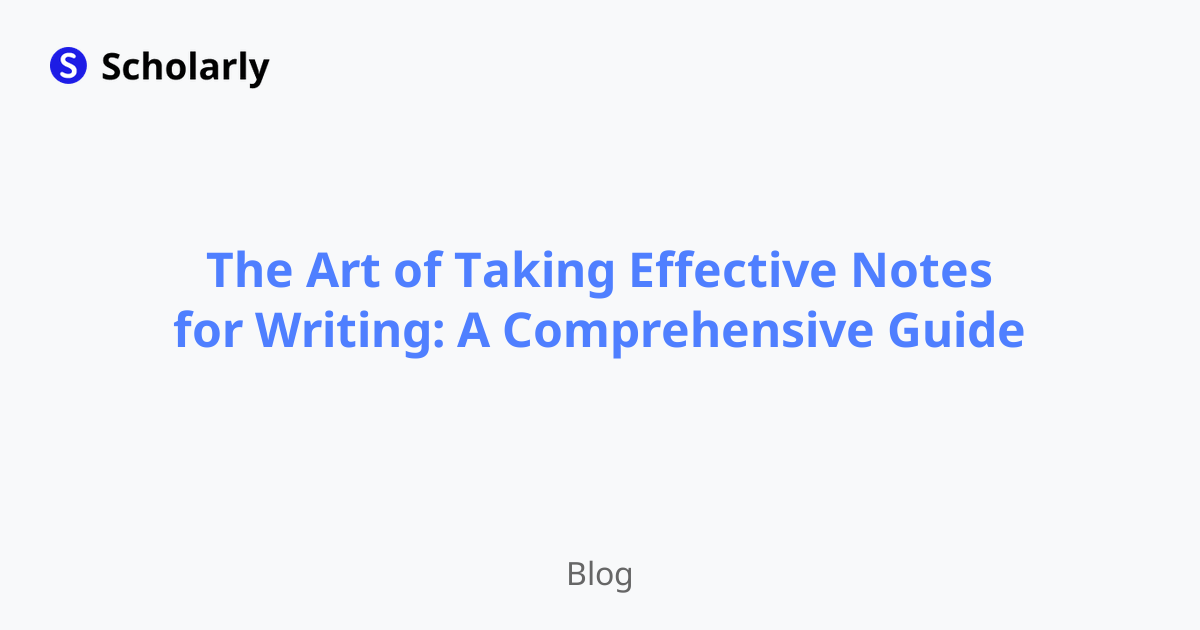The Art of Taking Effective Notes for Writing: A Comprehensive Guide
Learn how to take effective notes for writing and improve your writing skills with this comprehensive guide. Discover the best note-taking techniques, tools, and strategies to boost your creativity and productivity.

Introduction
Welcome to the comprehensive guide on the art of taking effective notes for writing. Whether you're a professional writer, a student, or just someone who enjoys jotting down their thoughts, mastering the art of note-taking can significantly enhance your writing skills. In this guide, we will explore the benefits of taking well-organized and focused notes, the best practices to follow, and the tools and techniques that can supercharge your note-taking process.
History
Past State
In the past, note-taking was primarily done using pen and paper. Writers would carry notebooks or notepads to jot down their ideas, observations, and references. While this traditional method is still popular, advancements in technology have introduced digital note-taking tools, allowing writers to organize and access their notes more conveniently.
Current State
Today, writers have a wide range of options when it comes to note-taking. Traditional pen and paper methods are still widely used, but digital note-taking apps and software have gained popularity due to their convenience and accessibility. These tools offer features such as synchronized note-taking across multiple devices, easy search functionality, and the ability to add multimedia elements to enhance the note-taking experience.
Future State
The future of note-taking is likely to be driven by advancements in artificial intelligence (AI). AI-powered note-taking apps are already emerging, offering features like auto-complete, smart suggestions, and even real-time transcription of handwritten notes.
Benefits
Taking effective notes for writing can offer numerous benefits, including:
Enhanced Creativity: By organizing your thoughts and ideas through note-taking, you can unleash your creativity and explore new perspectives.
Improved Focus: Taking notes helps you concentrate on the important details and filter out unnecessary information.
Better Retention: Writing down information reinforces your memory and improves understanding and retention.
Increased Productivity: Well-organized notes can save time by providing quick reference points and reducing the need to search for information.
Streamlined Writing Process: Clear and concise notes serve as a roadmap during the writing process, ensuring that you stay on track and maintain coherence.
Significance
The significance of taking effective notes for writing cannot be overstated. Note-taking enables you to capture fleeting ideas, intricate details, and noteworthy quotes that would otherwise be easily forgotten. It allows you to build upon your previous thoughts and observations, fostering a continuous cycle of knowledge and creativity. Additionally, well-structured notes can serve as a valuable resource when revisiting a topic or writing a subsequent piece.
Best Practices
To optimize your note-taking process for writing, consider the following best practices:
Choose the Right Tools: Experiment with different note-taking tools, such as physical notebooks, digital apps, or a combination of both, to find what works best for you.
Be Selective: Focus on capturing the most essential information and key points rather than trying to transcribe everything.
Use Abbreviations and Symbols: Develop your own system of abbreviations and symbols to quickly represent common words or phrases.
Organize and Categorize: Create a logical structure for your notes using headings, bullet points, and subheadings. Use tags or labels to categorize related notes.
Review and Revise Regularly: Allocate time to review and revise your notes periodically. This helps reinforce your understanding and ensures that the information remains fresh in your mind.
Pros and Cons
Here are the pros and cons of note-taking for writing:
Pros
- Enhances Creativity: Taking notes can spark new ideas and inspire creative thinking.
- Improves Organization: Well-structured notes make it easier to find and reference information.
- Aids Memory Retention: Writing down key points helps reinforce memory and understanding.
- Promotes Active Listening: Note-taking encourages active engagement and concentration during lectures or research.
- Increases Efficiency: Quick access to organized information streamlines the writing process.
Cons
- Potential Distraction: Focusing too much on note-taking can divert attention from fully absorbing the material.
- Incomplete or Inaccurate Notes: In the rush to capture information, important details may be missed or recorded incorrectly.
- Dependency on Notes: Over-reliance on notes can hinder the development of critical thinking and analytical skills.
- Time-Consuming: Thorough note-taking requires time and effort, especially during fast-paced lectures or extensive research.
- Lack of Flexibility: Once notes are written, they may limit the ability to adapt or modify thoughts and ideas.
Comparison
To optimize your note-taking experience, consider these popular tools:
Methods
Discover effective note-taking methods to boost your writing skills:
AI Impact
Artificial intelligence has the potential to revolutionize note-taking for writing. Here are the key AI applications, techniques, benefits, and challenges in this field:
Common Techniques
Explore common note-taking techniques that can improve your writing process:
Challenges
While note-taking can be a powerful tool, it also comes with its fair share of challenges. Here are some common challenges faced by writers when it comes to note-taking:
Potential Online Apps
Take advantage of these online apps to enhance your note-taking and writing experience:
Subheading 1
Content for Subheading 1.
Subheading 2
Content for Subheading 2.
Subheading 3
Content for Subheading 3.
Subheading 4
Content for Subheading 4.
Conclusion
In conclusion, mastering the art of taking effective notes for writing is a game-changer for any writer. By adopting the right tools, following best practices, and leveraging the power of AI, you can enhance your creativity, productivity, and writing skills. Remember to review, revise, and stay organized to make the most of your note-taking journey. Start exploring the exciting world of note-taking and unleash your full writing potential.
Try Our Popular AI Study Tools
Transform your study materials into interactive learning experiences with our most popular AI-powered tools:
PDF to Flashcards
Convert lecture notes and textbooks into study flashcards instantly
Text to Flashcards
Turn any text or notes into comprehensive flashcard sets
Image to Flashcards
Convert diagrams and handwritten notes into digital flashcards
YouTube to Flashcards
Generate flashcards from educational video content



